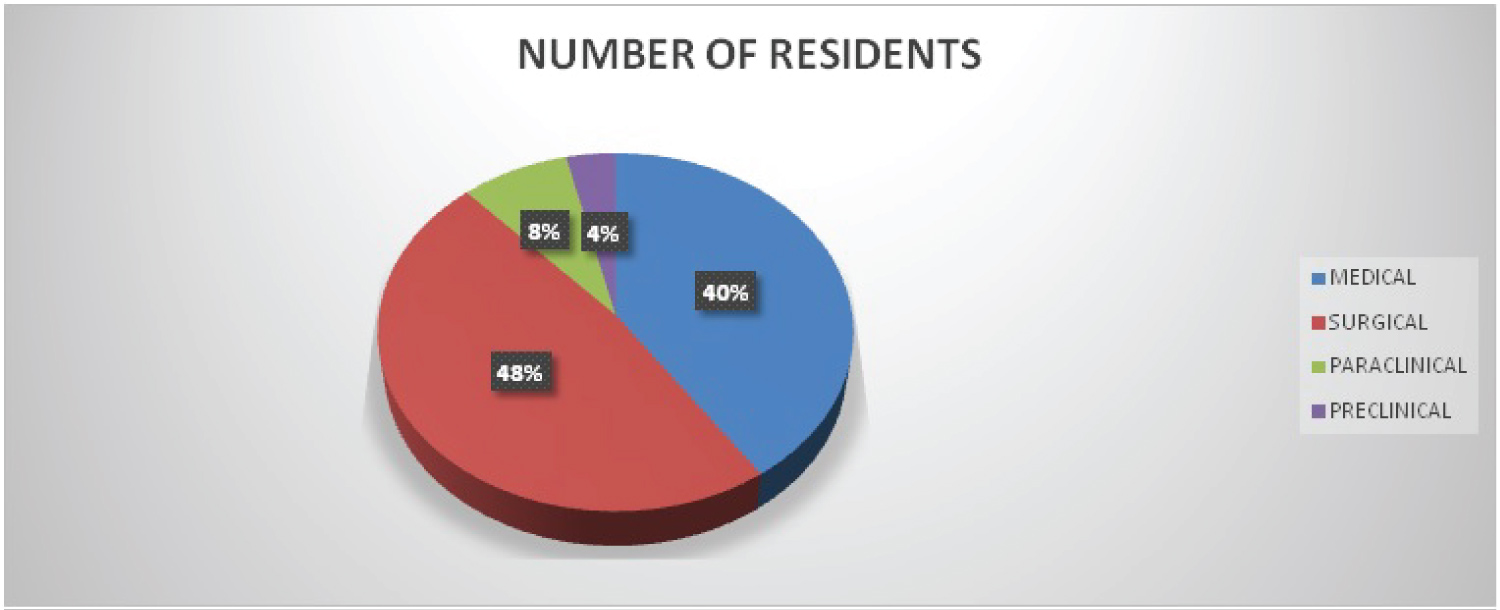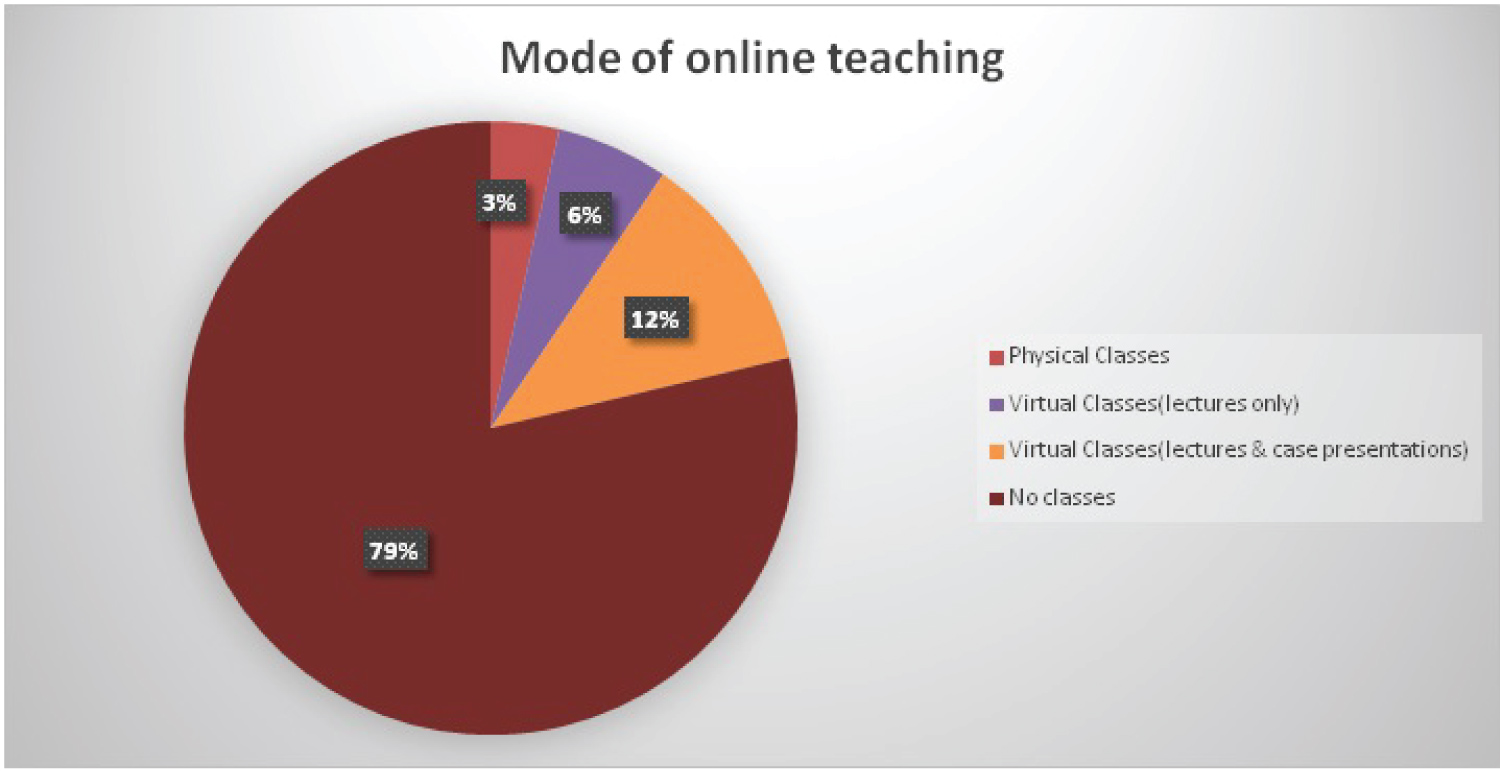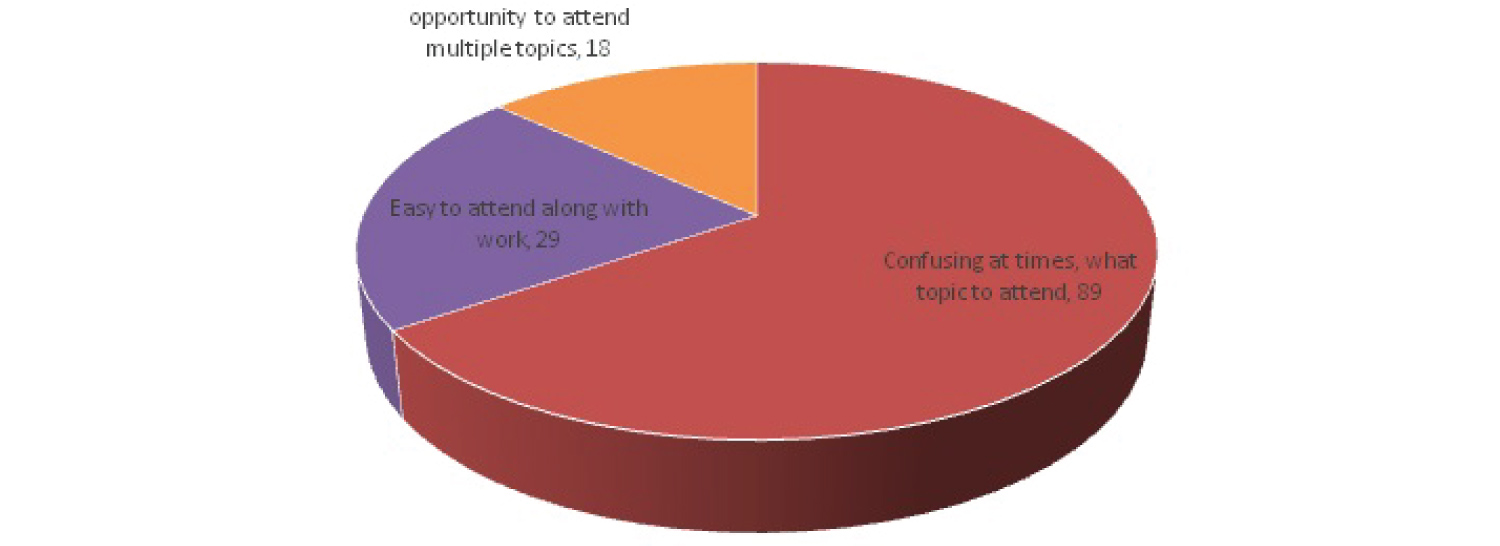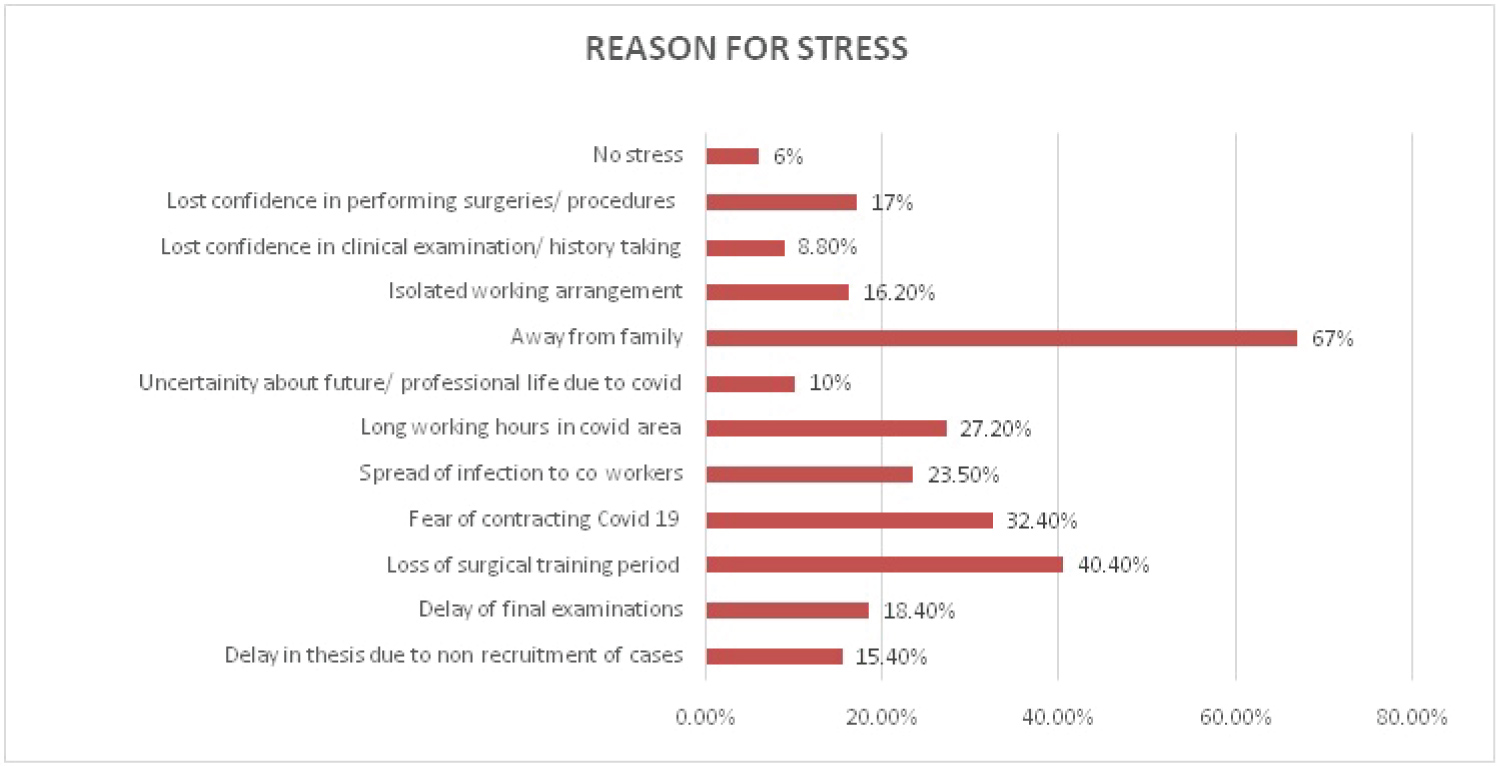The novel Covid-19 pandemic marked our lives in an indelible way. It affected negatively the educational training for all students worldwide; with significant modification within hospitals, especially postgraduate (PG) training experience in many ways.
We conducted an online survey among currently pursuing PG students of all departments working in HBTMC & Dr. R. N. Cooper Hospital, Mumbai to find out the impact of COVID-19 on PG teaching and learning. Difficulties and problems faced by them during the pandemic in terms of the progress in dissertation, lectures, seminars, clinical case discussions, surgical training, re-deployment challenges and the effect on their mental health was enquired.
Out of 250 students contacted, 136 (54%) responded. Nearly half (48%) were from surgical branches, and 106 (78%) had been deployed for Covid related duties. There was a decrease in PG teaching, as felt by students in terms of frequency and modality of classes. Only 29 of 136 (21.3%) had no problem with their thesis, all others encountered difficulties. Majority of residents (80.99%) felt their basic learning is affected in these times. Only 6% reported no stress but 42.6% felt stressed most or all of the time.
Our study highlighted the need to focus on PG training in a different way, give support to mental health, and have consideration for thesis work in these difficult times.
Covid-19, Postgraduate residency, Thesis, Mental wellbeing
Covid 19: Corona Virus Disease 2019; CPS: College of Physician & Surgeons; DNB: Diplomate National Board; ICU: Intensive Care Unit; OPD: Outside Patient Department; OT: Operation Theatre; PPE: Personal Protective Equipment; PG: Post Graduate
The World Health Organization (WHO) declared Coronavirus disease 2019 (COVID19) as pandemic on 11th March 2020 [1]. To contain and prevent the pandemic, Government of India announced many steps such as nationwide lockdown on March 25, 2020, promoting social distancing and infection control guidelines including the use of masks, personal protective equipment (PPE) [2,3].
The novel Covid-19 pandemic marked our lives in an indelible way, changing the reality we were used to. It affected negatively the educational training for all students worldwide; Given the social distancing recommendations, the Coronavirus emergency has led to significant modification within hospitals [4], especially postgraduate training experience in many ways [5].
1. Reduced Outpatient Volume
2. Reduced Inpatient Volume
3. Reduced Elective surgeries and Procedure
4. Reduced Learning Opportunities
5. Academic Progression Hampered
Medical students are recognised as high risk group for developing anxiety disorder as compared to general population, even under normal circumstances especially for those residing in the Middle East Asia. But, unlike other students, they have deeper understanding of the disease, which could increase awareness of its severity and impact [6].
There are few Indian studies analysing the effect on PG teaching, hence we conducted an online survey among currently pursuing PG students of all departments working in HBTMC & Dr. R. N. Cooper Hospital, Mumbai to find out the impact of COVID-19 on PG teaching and learning. Difficulties and problems faced by them during the pandemic in terms of the progress in dissertation, lectures, seminars, clinical case discussions, surgical training, re-deployment challenges and the effect on their mental health was enquired into.
Our study evaluated the effect of Covid Pandemic on
1. PG teaching and its current status
2. Training during Residency (surgical/medical/laboratory/research)
3. Impact on Dissertation
4. Mental wellbeing.
This cross-sectional study (online survey) was conducted from January 15, 2021 to January 30, 2021, to study the problems faced by PG students pursuing post-graduation (DNB and CPS), of all departments working in HBTMC & Dr. R. N. Cooper Hospital, Mumbai.
A Google form questionnaire was created and circulated among students, mentioning the questionnaire is completely voluntary, anonymous and participation is considered implied consent for study survey. Ethics Committee approval for consent waiver was applied for.
Appendix 1: Questionnaire regarding Impact of COVID-19 on Post-graduate Residency.
HBTMC & Dr. R.N. Cooper Hospital, Mumbai.
PG students who were pursuing primary Diplomate National Board (DNB), secondary DNB, and CPS (College of Physician & Surgeons) in all departments, working in HBTMC & Dr. R. N. Cooper Hospital, Mumbai during the study period.
Students pursuing post-graduate course in any department in HBTMC & Dr. R. N. Cooper Hospital, Mumbai.
• Did not give consent
• Medical interns
• Medical (MBBS) students
• Students doing observer posts
• Nursing Staff
• Nursing Students
The data collected through Google forms was in Excel format and its analysis was done with the help of Microsoft office (SPSS software).
The Google form questionnaire was sent to 250 Post-graduate students doing Residency in various clinical, para clinical and non-clinical subjects in Dr. R.N. Cooper Hospital. 136 out of 250 students responded (54%).
Majority (83.8%) are from age group 25-30 years. Almost 60% are female residents.
39 of these 136 (28.7%) residents have contracted Covid-19 infection during residency.
48% of Residents, who responded are from Surgical Branches (Surgery, Obstetrics & Gynecology, Orthopedics etc), 40% from Medical branches (Medicine, Pediatrics, Dermatology etc), 8% from paraclinical subjects (Microbiology etc.) and 4% from Preclinical subjects (Anatomy, physiology etc) (Figure 1). 78% (106) Residents have been deployed for duties for screening in Fever OPDs, Covid wards, ICUs and other wards created for Covid patients.
 Figure 1: Distribution of Residents as per Branch of Residency. View Figure 1
Figure 1: Distribution of Residents as per Branch of Residency. View Figure 1
Prior to covid pandemic, 101 Residents stayed in hostel, 31 stayed at home and 4 stayed outside in private hostels. After the start of Covid-19 Pandemic, 23 Residents (16.9%) who stayed at home changed their place of stay.
Frequency of classes: There has been reduction in the amount of Clinical teaching and number of classes taken for post-graduate residents since the start of Covid Pandemic. 49 students (36%) said that they did not have any classes prior to covid, whereas this number rose to 107(79%) post Covid (Figure 2).
 Figure 2: Frequency of Classes taken for Post graduate Residents Pre and Post Covid. View Figure 2
Figure 2: Frequency of Classes taken for Post graduate Residents Pre and Post Covid. View Figure 2
Mode of online teaching: 79% residents had no classes followed by 12% where Virtual method of online classes both lectures and case presentation was the common method (Table 1) (Figure 3).
 Figure 3: Mode of Classes taken for Post graduate Residents during Covid. View Figure 3
Figure 3: Mode of Classes taken for Post graduate Residents during Covid. View Figure 3
Table 1: Mode of Classes taken for Post graduate Residents during Covid. View Table 1
On enquiring about the satisfaction of Residents with mode and method of teaching, only 11% (15) residents were 100 percent satisfied, whereas 8.8% (12) residents are not satisfied at all. And 30% (41) residents are mediocrely satisfied.
91.2% (124) residents still feel that face to face teaching is important and cannot replace virtual teaching especially for clinical case discussion.
22% of residents had already submitted their thesis, and 21% had no problem in their thesis work. The residents of Clinical branches suffered the maximum difficulties in thesis work as, 29% residents complained the follow up cases are not coming to hospital, 21% had difficulty in recruitment of new cases, 25% had difficulties due to shutting down of elective OTs hence no surgical cases (Figure 4).
 Figure 4: Difficulties in Thesis work completion during Covid. View Figure 4
Figure 4: Difficulties in Thesis work completion during Covid. View Figure 4
80.9% (110) Residents reported that their basic learning is affected due to cancellation of elective OTs, speciality OPDs, lab and research work for surgical branches, medical branches and para clinical branches respectively.
65.4% (89) Residents opined that it was confusing at times regarding what topic to attend, 21.3% (29) felt that easy to attend along with work and 13.2% (18) felt that this is a good opportunity to attend multiple topics at a time) (Figure 5).
 Figure 5: Effect of Online CMEs/Seminars. View Figure 5
Figure 5: Effect of Online CMEs/Seminars. View Figure 5
61.8% (84) Residents admitted that attending these virtual classes/seminars/CMEs helped knowledge grow academically.
42% (57) Residents felt stressed sometimes, 33% (45) residents felt stressed most time of the day, 9.6% (13) residents felt stressed most time of the day. 6% (5) felt no stress at all.
• Delay in thesis due to non-recruitment of cases
• Delay of final examinations
• Loss of surgical training period
• Fear of contracting Covid-19
• Spread of infection to co-workers
• Long working hours in covid area
• Uncertainty about future/ professional life due to covid
• Away from family
• Isolated working arrangement
• Lost confidence in clinical examination/history taking
• Lost confidence in performing surgeries/procedures
Most common reason for stress was being away from family in 67% residents followed by lots of surgical training period and procedures in 40%, fear of contracting covid infection in 32% and long working hours in covid wards in 27% residents) (Figure 6).
 Figure 6: Possible Reasons for stress among residents during Covid Pandemic. View Figure 6
Figure 6: Possible Reasons for stress among residents during Covid Pandemic. View Figure 6
13.2% residents needed to consult counselor, 94% had access to counselor but only 68.7% actually consulted counselor (Table 2).
Table 2: Unmet Need for Stress Management among residents during Covid Pandemic. View Table 2
Post-graduate Residency is already a stressful period in a life of Medical Student. Covid pandemic has further caused unprecedented changes in their lives, daily challenges regarding their own health and their training many ways [5].
In our study, 49 students (36%) said that they did not have any classes prior to covid, whereas this number rose to 107 (79%) post-Covid. In survey conducted by Upadhyay Gaurav, et al. [7] during the COVID-19 pandemic, the number of PG classes have been significantly reduced to none as reported by 65.81%.
In our study, 12% classes taken by virtual method either ZOOM, Google meet etc. About the satisfaction of Residents with mode and method of teaching, 11% (15) residents were 100 percent satisfied, whereas 8.8% (12) residents are not satisfied at all. And 30% (41) residents are mediocrely satisfied. In comparison with survey by Upadhyay Gaurav, et al. [7] only 27.27% PG students were satisfied with the virtual classes; 40.9% were not satisfied and 31.8% were satisfied only to some extent.
Palan, et al. [8] have reported their exposure of conducting virtual learning systems and 'virtual' journal clubs. There are both advantages and disadvantages of virtual learning methods. Advantages being: a) Easy accessibility of the educational content, b) Facility of attaching images and radiographs to web based platforms (which can provide more valuable information and stimulate discussion), c) No risk of exposure to COVID-19 and d) Confer utilisation of time at home. However, the disadvantages include: a) No compulsion to attend the classes online, b) The virtual classes are time bound (the educators need to finish lecture and discussion with stipulated time), c) Lack of two ways discussion, in many such lectures, d) The infrastructure remains a potential hurdle for successful implementation of virtual learning platforms, and e) The success largely depends upon the consultant and faculty participation and input that guides and control the discussion [8].
• Lectures and theoretical classes have been cancelled in the teaching hospitals and institutions to prevent and contain the spread of COVID-19 [9].
• Special COVID services: The focus of the trainee has shifted to COVID-19. Historically postgraduate medical training was well rounded. If this paradigm shift continues for too long, trainees in medical specialties may lose or never develop skills in managing a broad range of medical pathologies.
• Trainees in specialized non-primary care specialties are on standby for covid wards due to markedly reduced patient volume in these specialties, this will reduce the learning opportunities for trainees to become competent in their respective fields.
Thesis preparation and submission is important part of post-graduate residency. And due to Covid pandemic shunting of residents to covid wards, prolonged working hours and reduction in the number of routine opds [9] and research work, thesis preparation, collection of data, statistical analysis and submission has been difficult.
The reduced patient load has affected the demonstration of many clinical skills [7]. This is also reflected in our study seen in Figure 4.
COVID-19 pandemic has had effect on mental health and wellbeing according to World health Organization (WHO) [10]. Since student distress and untreated anxiety are reported to negatively impact academic performance, professionalism and empathy towards patients, and contribute to academic dishonesty and attrition from medical school [6].
Mental well-being is often overlooked. COVID-19 has impacted the surgical training period. And there is lot of uncertainty regarding future prospects. They expose not only themselves but their family members too through them to COVID-19. Some are not able to visit their families because of lockdown measures.
Lasheras I, et al. [6] reported the overall prevalence of anxiety in medical students was 28% in systemic review with meta-analysis. Stress factors identified included worry about economic influences, academic delays, and the impact on their daily life. Curricular factors of unstructured or online learning, might promote distress and contribute to anxiety.
Saddik B, et al. [11] also reported mild to severe anxiety in medical students during COVID-19 pandemic which decreased after the introduction of online teaching programmes. Most of the stress was academics related, few studies revealed the introduction of online learning methods eased their burden and reduced anxiety levels [12]. Our study highlights the mental issues faced by our residents (Figure 6).
However, stress levels reported were less in our institution, compared to study done in Orthopedic residents in Delhi (96%) [7]. Major reasons cited by them were the loss of surgical training period (83.8%), fear of contracting COVID-19 (70.7%), uncertainty about professional life due to COVID-19 (66.6%), being away from family (63.64%). Positive changes in learning pattern were also seen, the inclusion of virtual learning environment results in increased trainee participation and consultant input in the virtual journal club and case-based discussions.
Lasheras I, et al. [6] in their review, the prevalence of anxiety is lower than the prevalence of anxiety prior to COVID-19 for medical students globally (33.8%). This finding also contrasts the tendency of anxiety rates in general population, where it is increased by four fold [6,12]. This could be explained by several reasons, the medical students have perceived higher grade of information on COVID's prognosis, transmission and broader knowledge of the disease as compared to other students [6,11] and general population, which them to build preventive behavioral response to the epidemic and reduce fear and anxiety. Their high levels of adaptive coping strategies and resilience have further contributed.
Most of the stress was academics related, few studies revealed the introduction of online learning methods eased their burden and reduced anxiety levels [6,13].
A community based meta-analysis [12] on the prevalence of anxiety revealed fourfold increase among general population (25% now as compared to 7.3% prior to pandemic) as compared to anxiety in medical students. The anxiety levels are significant higher in women. The reasons could be their more socialising behaviour [14], more emotional and being them the main caregivers within the family [15], they make them more vulnerable to stress due to increased house chores, closure of schools and work from home for working women.
The prevalence of anxiety was more seen in young age population [12], which is also seen in our study, where maximum (84%) PG residents belonged to 25-30 years of age group. Uncertainty about the future of jobs and careers, financial worries and being techno-savvy, more active on social websites increases their exposure to news and increases the stress [12,16-18].
It was also seen, anxiety levels were high in people living alone or unmarried people [12]. Several studies [18,19] reported that the feelings of loneliness and lack of social support were among the strongest correlators with anxiety during the pandemic. 67% of PG residents in our study were stressed due to social isolation, being away from home.
Occupation is the independent factor determining the degree of stress. The prevalence of stress in medical students is less as compared to general population [12]. The stress was seen less in people working from home [20] or who remained physically active or took the opportunity to pursue hobbies [14,15].
Santabarbara J, et al. [21] conducted meta-analysis of prevalence of anxiety in different occupational categories of HCW (i.e., nurses, medical doctors and frontline HCW). The prevalence of anxiety reported were high as 25%, 27% and 17% in HCW, nurses and doctors respectively.
Our study shows the disruptive effects of COVID-19 pandemic on the education and training of our PG students and the impact on their mental health.
Attention to these issues for our budding doctors is very important and this will help in developing a stable healthcare infrastructure to combat COVID. The way forward is having regular meetings, audits and discussions to facilitate our residents training and work patterns, and measure to keep their mental well being stable.
We would like to extend our sincere thanks to Dean Dr. Pinakin Gujjar and our Head of Department Dr. Sneha Shirodkar for their continuous support and allowing us to share hospital data.
Author 1 and 2 have conceptualised and implemented the study and analysed data. Author 3 and 4 were involved in data collection and contributed to analysis.